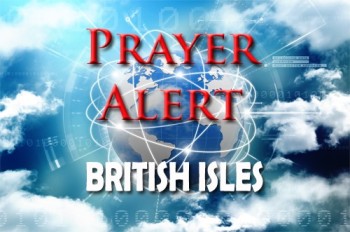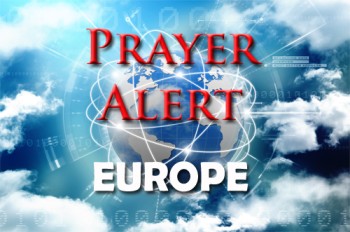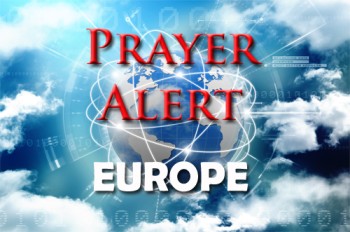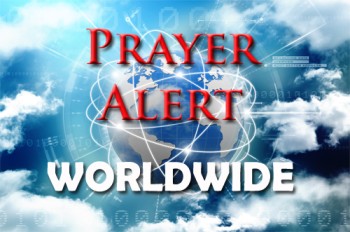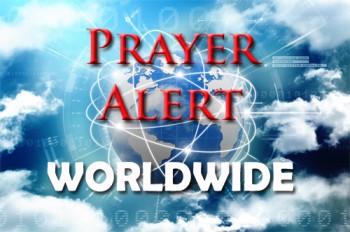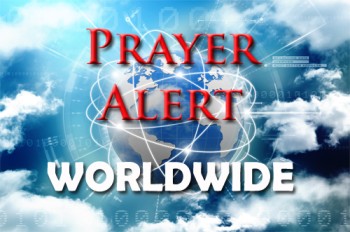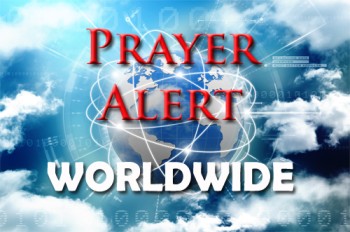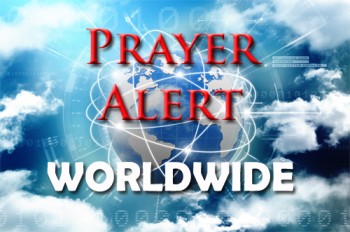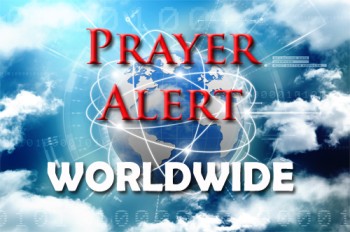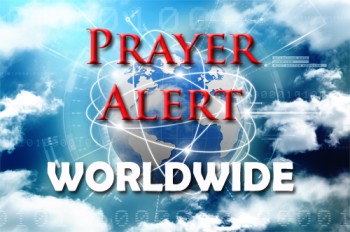
David Fletcher
David Fletcher is Prayer Alert’s Editor.
He is part of a voluntary team who research, proof-read and publish Prayer Alert each week.
If you would like to make a donation towards our running costs, please click here.
British scientists have identified a gene that doubles the risk of dying from Covid-19, opening up possibilities for targeted medicine and providing new insights into why some people are more susceptible to the disease than others. Researchers at Oxford University found that 60% of people with South Asian ancestry carry the high-risk gene. The discovery partly explains the high number of deaths seen in some British communities, and the effect of Covid in the Indian subcontinent. The scientists found that the increased risk is not because of a difference in genetic coding of the proteins, but because of differences in the DNA that makes a kind of ‘switch’ to turn a gene on. That genetic signal is likely to affect cells in the lung. The study shows that the way in which the lung responds to the infection is critical. This is important because most treatments have focused on changing the way in which the immune system reacts to the virus.
Kasia Wappa lives by Poland’s national park where a humanitarian crisis is unfolding on a scale not seen since World War 2. She is part of a network trying to save emaciated Middle Eastern immigrants who have been emerging from the wilderness since September. Most had spent days without food or water and were suffering from hypothermia and exhaustion. Some were sick from drinking swamp water. Kasia began by donating warm clothes, and now helps rescue parties retrieve lost and starving people from the woods. But the flow of migrants has increased, and she warns that many probably never make it. Ten deaths have been confirmed, and they have rescued many on the verge of dying. The Polish government has built a three-kilometre deep security cordon the length of its Belarus border to curb illegal immigration. All reporters are banned, creating a media blackout to hide the scale of the crisis. Rescuers now behave like insurgents, operating at night and evading police patrols.
FELM, a Finnish Christian missionary group, has cut ties with Palestinian children's rights NGO Defence for Children International-Palestine. Mr Stefansson, the charity's executive director, said they had concerns about possible banking sanctions of DCIP who are one of six Palestinian groups accused by Israel of channelling donor aid to militants and labelled as a terrorist organisation. The six accused groups have close ties to the Popular Front for the Liberation of Palestine, which carries out deadly attacks on Israelis and is on US and EU terrorism blacklists. DCIP rejects the charge and says it has asked FELM to reconsider cutting funds. Steffansson said it is impossible to maintain ties with the group as, ‘It could have impacted the work we do in 30 countries through banking services.’ DCIP relies on European aid to fund its advocacy and rights monitoring work in the Israeli-occupied West Bank and Gaza.
Txai Suruí is a climate activist who is part of an indigenous community in the Amazon rainforest. She spoke to world leaders at COP26 about the direct impacts of climate change that her tribe is already experiencing. But after the speech she was publicly criticised by President Bolsanaro for ‘attacking Brazil’. This prompted many people to send her abuse on social media. When she spoke to a BBC reporter, she said, ‘I think I said the right words because they attacked me.’ Brazil hosts the two most important and diverse tropical forests globally. Almost 20% of the Amazon forest has been cut down in recent decades. This deforestation must stop before it becomes a savanna. Between 2004 and 2012, Brazil successfully controlled deforestation by 80%, by reducing illegal foresting, creating protected areas and restricting soya and cattle expansion. This resulted in increased food production by large farming complexes and strengthened smallholder farming. See
Space satellites have become strategic assets and valuable military targets. China has vowed to become the world's leading space power by 2045. In 2019 it landed its Chang'e-4 lunar probe on the far side of the moon - something which had never been done before. The US air force secretary said, ‘China has moved aggressively to weaponise space. Conventional deterrence and operations depend on access to communications, intelligence, and other services provided by space-based systems. As a result, China has pursued and fielded a number of weapons systems in space designed to defeat or destroy America's space-based military weapons systems and ability to project power.’ Much of what happens in space affects life on earth. The 3,000+ active satellites orbiting earth today and their services have become indispensable. Among these are US military-operated GPS satellites for positioning, navigation and timing, serving military and civilian needs - for example taxis, grocery delivery services, monitoring weather, and communications.
US secretary of state Antony Blinken said, ‘The US and its allies want to bring Iran back into compliance with the nuclear deal, including looking at all of the options necessary if diplomacy doesn’t work.’ He was commenting on US talks with Germany, France and Britain about Iran. ‘We are absolutely together in lockstep on how we are approaching the challenge of getting Iran back into compliance with the nuclear agreement,’ he said. ‘And that’s new because we’ve actually been at odds in recent years. But we do not yet know if Iran is willing to come back, engage in a meaningful way, and get back into compliance. If it isn’t, if it won’t, then we are looking together at all of the options necessary to deal with this problem.’
500 Hindu nationalists accused 60+ Christians of forcible conversion. The mob harassed them, searched their belongings, including women’s undergarments, physically assaulted them, and vandalised their vehicles. But when the police came they arrested the Christians, not the Hindus. Violence and hate incidents against Christians are increasing. An intervention specialist commented, ‘These include disrupting or stopping Sunday services, physical attacks, vandalising churches, social boycotts, false accusations of religious conversions and as in this case arrests on the basis of false charges. Many attacks remain unreported and unrecorded through fear of further victimisation’. Also, on 6 November, fifty radical Hindu nationalists went from house to house in Metapal village, attacking Christians, to make it a ‘Christian-free’ village. Wielding fists, clubs, and other objects, they beat everyone including women and children leaving nine seriously injured. Six were hospitalised and remain in a critical condition. Without significant government intervention, 2021 will be the worst year on record for Christian persecution in India.
An IS attack in October has triggered a crescendo of acts of violence against and displacement of Sunnis in a province in Iraq, bordering Iran, which has long suffered from cells operating in its dense orchards and Hamrin mountains. At least eleven people from the village of al-Rashad in the eastern Diyala province were killed. The attack was followed by retaliatory violence against local Sunnis, sparking fears of a return to the years of massive sectarian bloodshed. An operation conducted on 3 November by Iraqi security forces as well as additional security forces sent to the area has failed to quell widespread concerns and indignation. Reportedly several men were abducted and killed, followed by more of their relatives after they had been called to collect the bodies. Armed men subsequently attacked the Sunni-majority village, killing people, burning and destroying homes and farms, in retaliation for assumed ‘collusion’ by the entire local Sunni community with IS.
Since hostilities began last November, there have been rapes and massacres of civilians on a large scale. As far back as January, aid agencies were sounding alarms about how much worse the situation could get. Continued fighting, bureaucratic hurdles, and aid blockades have since led to a continuing famine affecting hundreds of thousands of people. More than two million people have been displaced from their homes, and tens of thousands have died. The declaration of a nationwide state of emergency by the federal government on Tuesday has triggered fears of more instability. The war has degenerated into a brutal conflict to crush and erode Tigray, and talk of elimination of entire ethnic groups has been normalised. The USA has sent a special envoy to Ethiopia for talks, and on 16 November there will be a meeting of the East African bloc Intergovernmental Authority on Development to discuss the worsening conflict.
Now in its seventh year, the crisis in Yemen is no longer headline news. But the conflict continues to have a devastating impact on people’s wellbeing, and on their mental health in particular. In Hajjah, Doctors Without Borders teams have found a high need for mental health services. The range of conditions that they treat is very large; there are people suffering from anxiety and insomnia, psychosis, depression, bipolar disorder and post-traumatic stress disorder. They regularly see patients following suicide attempts: such an attempt might be provoked by a variety of circumstances. Severe symptoms of psychosis can manifest as auditory hallucinations which tell the patient to hurt him or herself, or a patient might be suffering from severe depression. Lack of awareness leads to stigma, discrimination, and segregation, and this leads to people hiding their conditions. Yemen’s conflict has also reduced access to healthcare, education, and food, as well as restricting freedom of movement.

